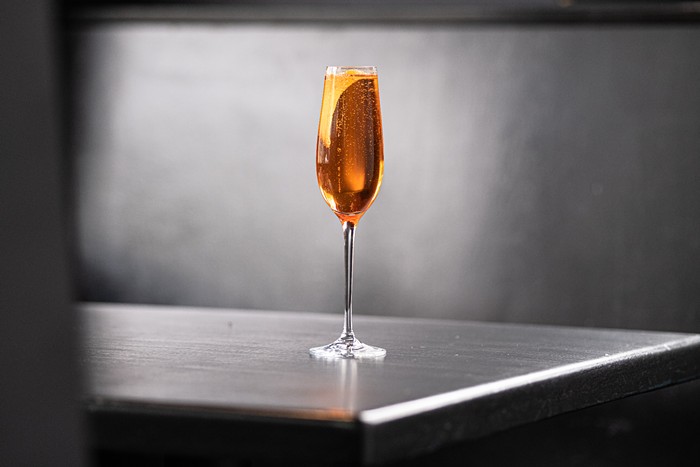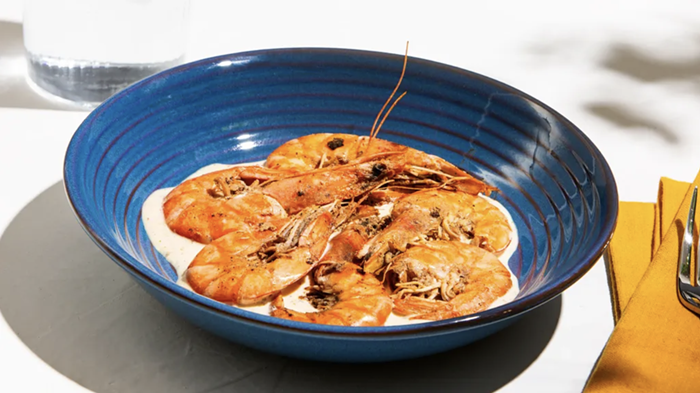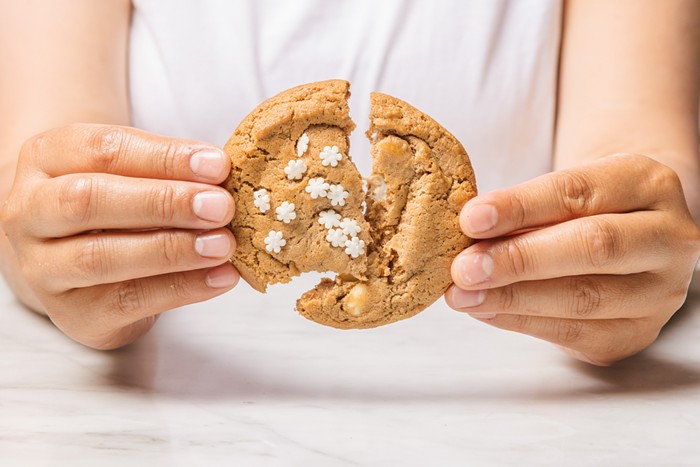
“Like every other restaurant owner in this city, we’re just trying to figure it out.”
So says Edouardo Jordan, the chef and restaurateur behind Ravenna destinations JuneBaby, Salare, and Lucinda Grain Bar. Except that Jordan is, of course, not like every other restaurant owner in the city. The chef—a multiple James Beard Award winner featured by everyone from the New York Times to Esquire to People magazine—enjoys a form of national restaurant prominence that comes along only once, maybe twice in a generation for a Seattle chef. He’s part of a continuing vanguard of Black restaurant excellence with deep roots in the American culinary tradition, one that’s put him in rare and lauded company. Put simply, Jordan is a star.
So when a chef like Edouardo Jordan tells you, in no uncertain terms, that this is a wild and terrifying moment to be in the restaurant business, we should all be listening. “We’ve had discussions with landlords, reviewed all of our books, and we’re trying to determine next steps,” Jordan tells The Stranger, “but there are just so many unknowns.”
He’s not alone. The first six months of the coronavirus have been devastating on the American restaurant industry, particularly independent restaurants that are owner-operated. Some one-third of restaurants nationwide are facing closure this year, a staggering figure first reported by Bloomberg. Dozens of Seattle restaurants have closed already. It’s a sobering time to be in the food and drinks business.
But Edouardo Jordan is ready to fight. “Right now it’s about being creative, being innovative, throwing balls in the air,” he says. That means a reimagined workday for the chef, with a lot more time spent on the computer. (Lauded chefs, they’re just like us.) “It’s a little overwhelming—a different kind of workload.”
As far as being creative and innovative goes, this, at least, is familiar ground for Jordan and his team. What’s emerged is a new take on the combined kitchen and beverage programs of Lucinda, Solare, and JuneBaby, one that offers Seattle diners a range of daily changing options from Jordan’s imagination, plus the ability to experiment and cook with JuneBaby ingredients at home.
First and foremost there’s the takeout, a daily changing set menu of seasonal foods drawn from Jordan’s bank of dishes. Proteins stay the same week over week but are met by a kaleidoscopic and deeply seasonal array of sides and co-servings. “Corn is here now,” says Jordan, “plus tomatoes are just coming into play, and melon—we just kind of seasonally interpret and make adjustments from there.”
Dinners range from $60 to $72, feed two comfortably, and include showstopping desserts from Jordan’s pastry team (think homemade candy bars, chess pie with lemon white chocolate whipped cream, or peach rhubarb pudding trifle). You should definitely pair this with a pre-batched cocktail from Megan Fitzpatrick’s beverage program, particularly the visually stunning rhubarb daiquiri.

Beyond the realm of daily takeout, Jordan and his team have built a pantry program worthy of national acclaim, drawing from the restaurants’ arsenal of impeccable sourced ingredients and recipes. This means fresh baked breads, buns, and biscuits; ice cream in flavors like cinnamon oatmeal raisin cookie and grains of paradise; jams and stocks and pantry staples like molasses, or good cane syrup; and endlessly customizable dry mixes for cornbread, pancakes, and pre-batched granola, which can now be ordered and shipped to any address in the country.
And then there is the pimento cheese.

“Our pimento cheese has always been a crowd favorite,” Jordan tells me. “It’s a classic Southern dish. I didn’t grow up on it necessarily—I’m from Florida, and Georgia is more the pimento cheese world—but I’m all about trying to make something better than what I’ve ever had. When I came up with the recipe and developed it, I knew it was a winner, and then guests would come in and say this was the best pimento cheese they’d ever had.”
This is no hyperbole. Let me repeat the claim: this is the best pimento cheese I’ve ever had. Jordan’s version starts with sharp cheddar and then adds an array of spices and modifiers to create something endlessly complex, far beyond basic cheese dip. Is that... paprika? Maybe a little... beer? Or cider? Apple cider vinegar even?
“I won’t be telling you the recipe,” the chef says, laughing, “but yes, there’s sharp cheddar and spices in there, and things of that nature.” In the before times you had to have a reservation at one of Jordan’s restaurants to enjoy it—no easy feat as the din of acclaim rose to a roar by the end of 2019—but now you can order Edouardo Jordan’s pimento cheese in 8oz container increments, to be enjoyed back home (or on the sidewalk in front of JuneBaby, in case you only make it that far).
Jordan’s pimento cheese isn’t just good; it also represents a next step for his company to scale, survive, and potentially thrive during our uncertain times. “We knew an online presence was a good opportunity to sell pantry items, as well as retail items like t-shirts,” the chef tells me. “As soon as we decided to open our doors for takeout in late March, we started working on the pantry program. And there’s a lot of room to grow that now.”
Jordan’s next step is to place JuneBaby products, including pimento cheese, into multiple stores and multiple states in the months and years to come. This represents a long-simmering plan for JuneBaby’s growth and expansion, brought to boil by the external pressures of the restaurant business in 2020. “This has always been part of the next step; if I had a big operations team we would have done this already,” says Jordan, “but for now it’s me and a couple of staff members and our combined brainpower trying to put it together.”
Scaling a product like pimento cheese involves bringing in a co-packer, and trusting someone else to honor his recipes. That’s no easy task. “It’s a whole new world,” says chef Jordan. “But if I plan to be relevant in business during COVID, I need to build revenue streams and cushions. If I want JuneBaby and Salare to be here when this is all said and done, I can’t just rely on takeout and in-house dining to sustain that.”
If there’s a future world where I can buy a box of JuneBaby instead of a box of Jiffy, well—perhaps there’s hope for humanity yet. In the meantime there’s JuneBaby Pantry, stocked and ready to be introduced into your home cooking routine. And don’t worry about being too precious with the recipes.

“Cooking at home with our products is all about experimenting,” says the chef, which means it’s fair game to add strawberries or chocolate to the pancake mix, or use your own favorite local honey and butter alongside the cornbread, or make your snack dip fantasies come true with the pimento cheese. I built an epic french toast from a loaf of Lucinda’s sourdough with tarragon butter and kumquat jam, resulting in an unexpectedly moving breakfast situation, the sort of meal that reminds you why we care about food in the first place.
Best of all, this kind of improvisation has the chef’s explicit blessing. “I think it’s pretty amazing for people to be able to take our ingredients and have at it,” Jordan tells me. “In fact I think it’s a blessing,” he continues. “We’ll keep this pantry program even if we open up in-house dining again, even if we are able to become a ‘normal’ restaurant again. Because now people in Texas and Florida and South Carolina can enjoy our products. Our reach is a lot bigger now. I think that’s beautiful, you know?”


















